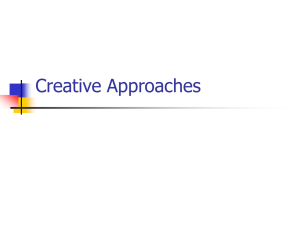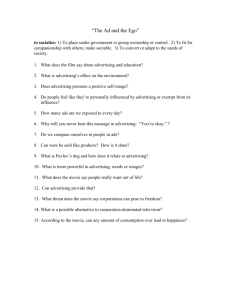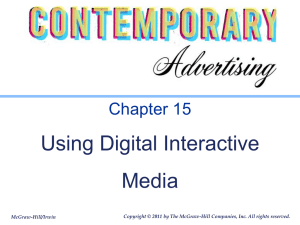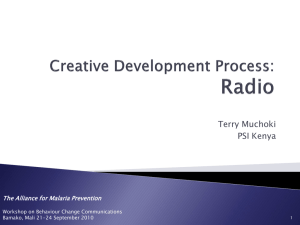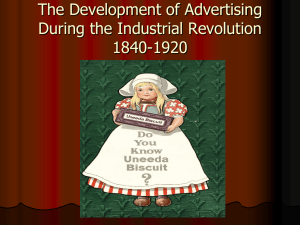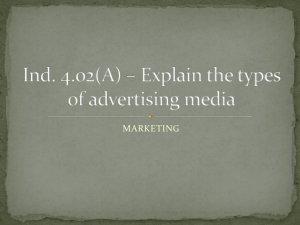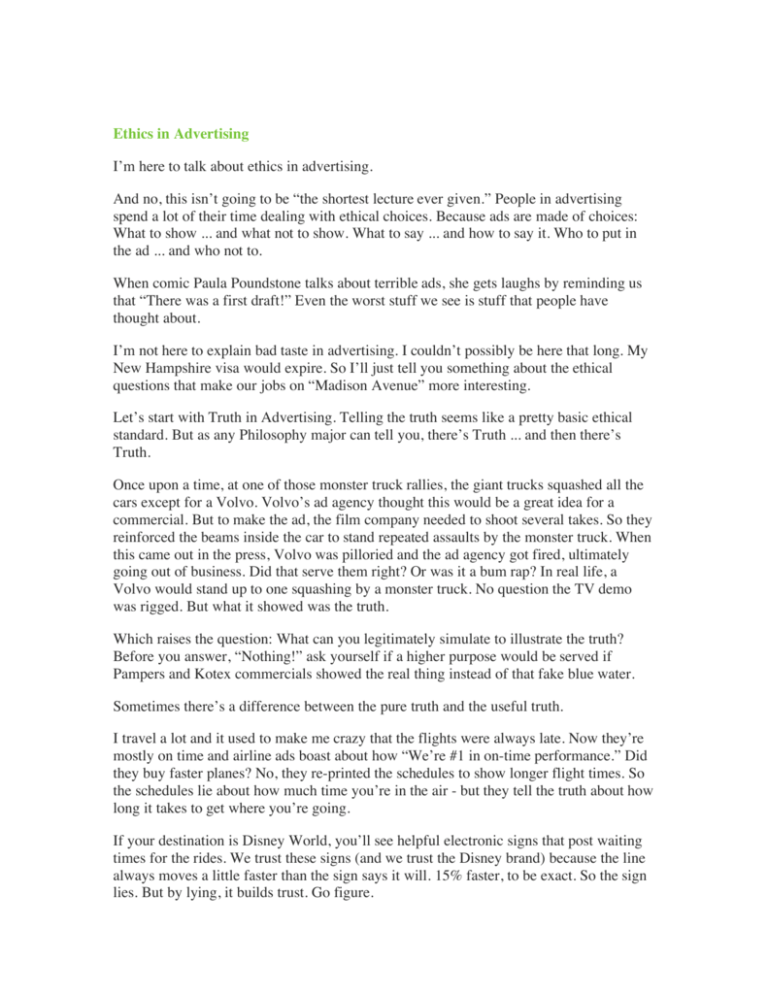
Ethics in Advertising
I’m here to talk about ethics in advertising.
And no, this isn’t going to be “the shortest lecture ever given.” People in advertising
spend a lot of their time dealing with ethical choices. Because ads are made of choices:
What to show ... and what not to show. What to say ... and how to say it. Who to put in
the ad ... and who not to.
When comic Paula Poundstone talks about terrible ads, she gets laughs by reminding us
that “There was a first draft!” Even the worst stuff we see is stuff that people have
thought about.
I’m not here to explain bad taste in advertising. I couldn’t possibly be here that long. My
New Hampshire visa would expire. So I’ll just tell you something about the ethical
questions that make our jobs on “Madison Avenue” more interesting.
Let’s start with Truth in Advertising. Telling the truth seems like a pretty basic ethical
standard. But as any Philosophy major can tell you, there’s Truth ... and then there’s
Truth.
Once upon a time, at one of those monster truck rallies, the giant trucks squashed all the
cars except for a Volvo. Volvo’s ad agency thought this would be a great idea for a
commercial. But to make the ad, the film company needed to shoot several takes. So they
reinforced the beams inside the car to stand repeated assaults by the monster truck. When
this came out in the press, Volvo was pilloried and the ad agency got fired, ultimately
going out of business. Did that serve them right? Or was it a bum rap? In real life, a
Volvo would stand up to one squashing by a monster truck. No question the TV demo
was rigged. But what it showed was the truth.
Which raises the question: What can you legitimately simulate to illustrate the truth?
Before you answer, “Nothing!” ask yourself if a higher purpose would be served if
Pampers and Kotex commercials showed the real thing instead of that fake blue water.
Sometimes there’s a difference between the pure truth and the useful truth.
I travel a lot and it used to make me crazy that the flights were always late. Now they’re
mostly on time and airline ads boast about how “We’re #1 in on-time performance.” Did
they buy faster planes? No, they re-printed the schedules to show longer flight times. So
the schedules lie about how much time you’re in the air - but they tell the truth about how
long it takes to get where you’re going.
If your destination is Disney World, you’ll see helpful electronic signs that post waiting
times for the rides. We trust these signs (and we trust the Disney brand) because the line
always moves a little faster than the sign says it will. 15% faster, to be exact. So the sign
lies. But by lying, it builds trust. Go figure.
Something marketers are beginning to realize is that how a brand actually behaves counts
more than what they say. This is good news. Advertising copywriters used to have a
monopoly on telling a brand’s story. Now, thanks to the Internet, the most influential
voices in advertising are yours: You hear about a product, the first thing you do is go
online and see what your peers are saying about it.
Advertisers know this. Ads for reputable companies almost never lie. The cost of being
caught out is simply too high. It can take years to undo the damage. Also, the people
inside the company want to be able to look at themselves in the mirror. We often think of
business people as belonging to some other, vaguely malevolent species, but remember
that most of them are you in a few years.
So we tell the truth - but not always the whole truth. We want to put our clients in the
best light. McDonalds doesn’t advertise the calorie count for Big Macs, but they make it
easy to find out. Most people don’t want to know. On the other hand, drug makers have
to to spell out side-effects because the information can mean life or death.
How much of the truth we owe to others is an ethical question. In practice, the answer
depends on who they are and what’s at stake.
On my way here, I saw fliers around campus promoting activities that would shock a lot
of Americans - and are probably illegal in a few of the states where I have clients.
Obviously, advertising practices are relative. But knowing that what’s good fun in
Hanover, New Hampshire, is indictable in Lubbock, Texas, is not a very useful moral
compass. Any of you who are Pre-Law know the courts have the same problem in
defining obscenity. “Community standards” are the yardstick.
So here’s a pop quiz: Is the world better served by an advertiser that universally acts
according to its own corporate conscience...? Or an advertiser that unfailingly respects
the social mores of its audiences? Like you.
For a company trying to sell something, a TV commercial is like having a job interview
with millions of people all at once. The ad wants to make a good first impression, and
really, really doesn’t want to make people mad. But different people react differently.
Some advertisers try to be outrageous. A hip-hop brand needs Street Cred. Youth brands
know that dismayed parents are their best advertisement. What the FCUK brand really
stands for is “Your mom would hate this.”
The brands we respond to most are a little bit like clubs, where only “we” get it,
(whoever “we” are). Shared experiences and inside jokes make us feel like insiders. But
does the advertiser have an ethical responsibility to the larger community: to outsiders
who might see the ad by mistake and find it hurtful?
Most of us in this room, and in business, would say Yes ... to a degree. “To a degree”
sounds like a hedge, but it’s reality. An ad that shows parents putting presents under the
tree on Christmas Eve will upset some people who think it’s outing Santa Clause, and
others who don’t celebrate Christmas. On average, 15% of people will find something
objectionable in any ad, no matter what it shows. So everything we do in advertising is a
judgment call. And we know going in that we’re going to fall at least 15% short of what
moral philosophers like Geoffrey Klempner at Oxford tell us that true Ethics demand.
Truly Ethical living, with a capital E, requires more than honesty, fairness, decency, and
even right action. It requires owning 100% of the responsibility for any consequences of
what we do, intended or not. Klempner says this is an impossible standard for a
marketplace, and barely within reach for individuals. Try as we might, “collateral
damage” happens all the time. If you’ve ever accidentally hit Reply-to-All on an email,
you’ve found this out.
Ethics in casting
Going back to the “club” idea, if you were recruiting for a club, the first thing you’d do in
an ad is signal your audience: Rugby players! Singers! Gays and Lesbians! Advertisers
do the same thing for the same reasons. We want our ads to say “this message is for
YOU.” Naturally, we don’t put the real you in the ads. The real you is your campus ID
and your driver’s license photo. We’ve seen it. That’s why we do casting.
Casting decisions can pose ethical choices. Who you put in an ad sends a message. Do
beauty and fashion ads reflect the aspirations of American girls? Or do they distort those
aspirations by creating an unattainable and objectified standards?
It takes a brave advertiser to swim against the cultural tide. Dove did it and caused a
sensation.
Dove is succeeding by challenging convential ideas of beauty that advertising helped to
create. Does this make Dove:
A) Cynical
B) Noble
C) Smart, or ...
D) All of the above
That was the easy question. They get harder. Here’s an image from a newspaper ad
showing a group of business people.
Do you see anything objectionable here? Probably not. These people could be the
Dartmouth IT department on dress-up day. But let’s say you owned the Dell company
and you knew for a fact that you’d sell more computers in Latin America if you showed
the boss as a dark-haired man ... changed the Asian woman to a blond who was bringing
him coffee ... and didn’t show the black woman at all. Would you change your ad for
Latin America?
Social norms and ethnicity are tripwires wherever you go. Here’s an ad from Microsoft
that neutralizes the issue by putting dinosaur heads on everybody.
Advertising online
The Internet changes everything. If you are interested in making ethical choices part of
your career, get into interactive marketing. The online world is like the Wild West, where
social conventions and even the Law haven’t been settled yet. How many of you have
used file-sharing sites? File-sharing is just one of the technologies that’s turning
intellectual property law inside out. Not to mention raising ethical issues. [When I
download Dave Matthews for free, I feel like Robin Hood. But I wouldn’t dream of
shoplifting the same music from a store.]
The internet challenges the ethics of advertisers more than mass media like television
because it is more democratic and more private. Only big companies can afford milliondollar ads; and it’s hard to get away with much when 10 million people are watching you
on TV. In a very real way, the audience serves as the Conscience of the marketer. But a
website or a podcast or Howard Stern on satellite radio is free to reflect or incite the
passions of a much narrower community.
On the web, an oil company can present itself as an environmentalist to Sierra Club
members while calling for roll-backs in regulations among chamber of commerce
members. That’s duplicitous, right? But we do the same thing when we send out different
resumés or post different dating profiles online.
Cigarette advertising was banned from broadcast media before you were born. In 1998,
most other forms of tobacco advertising were eliminated. But Marlboro’s marketing has
never been more successful. Banning traditional advertising forced them online, and into
into viral marketing techniques that other industries are just beginning to figure out.
The one-to-one world of the Web is very different than the one-to-many world of
broadcast advertising. The Internet is ethically agnostic. Which makes your ethics more
important. In your careers, you will have to tools to communicate as you wish. You will
have to be the conscience of your organizations.
Tobacco isn’t the only potentially lethal product that poses ethical, not to mention public
policy questions for communicators. Ad agencies and individual advertising people make
their own decisions about categories like tobacco, guns, and political campaigns. Many
say “No thanks” to working on certain businesses. But would you turn down the Kraft
Macaroni and Cheese assignment because another division of the same company makes
Marlboros?
Speaking of Mac and Cheese, is food advertising ethical? Are ads making Americans
overweight, or do we do that to ourselves? Not long ago, America’s biggest food
comapany - Kraft - decided to stop advertising high-fat products to children. The
American Psychological Association says that advertising aimed at young children is
inherently exploitative. And, with childhood obesity a growing concern, Kraft made a
decision that addressed both issues. Good for them! We want corporations to do the right
thing. And when they do it, they want us to know.
What are the ethics of advertising good deeds?
80% of Americans say they feel better about companies that are aligned with social
causes. That’s one of the reasons American Express started the Tribeca Film Festival to
bring people back to lower Manhattan after September 11. It’s why Johnson+Johnson,
always at the top of the polls as a Responsible Company, runs ads promoting Nursing as
a career. Does the fact that nurses order so many medical supplies diminish the value of
what J+J is doing in its uplifting ads?
Before Hurricane Katrina, Wal-Mart was having image problems. But they had 45
truckloads of relief supplies in position before Katrina made landfall, and delivered a lot
more after. They also dispatched PR people with those trucks so the world would know
about their good deeds.
Does the extra business and good will these companies stand to gain somehow lessen the
good that is actually done?
In the 1990s, a big company donated a quarter-million dollars in food aid to Bosnians in
the wake of the war there. By all accounts, the aid did a lot of good. Later, the company
spent over a million dollars to advertise their good deed here in America. How many of
you agree that’s pushing it? Splendid. Here’s the essay question: As the president of that
company, write a set of specific guidelines that will encourage enlightened self-interest ...
and prevent cynical opportunism. This isn’t academic. Some of you will run companies.
Part of your job will be translating your beliefs into policy.
Industry self-regulation and free speech
Since we’re talking about advertising, let’s take a break for a word from our sponsor. As
an industry, ad people strive to practice enlightened self-interest every day. So we’ve
created a host of gatekeepers that steer companies towards truth and fairness, and
sometimes step in as enforcers. The Children’s Advertising Review Unit, for example,
polices messages aimed at kids. They stopped or changed the ads in 134 out of the 144
cases they saw in 2003.
Advertisers regulate themselves for the same reasons that campus organizations do:
Better we do it ourselves than have the Administration do it for us.
Outside the U.S., governments exercise far more control over ads than ours does. Here,
the First Amendment grants advertisers much of the freedom to express themselves that
we enjoy as individuals. But not all. Just ask Nike.
They were accused in the press of allowing Asian subcontractors to operate sweatshops.
Since good people like us don’t want to buy sneakers made by serfs, Nike launched a PR
campaign to tell its side of the story. A California activist brought suit, on the grounds
that Nike’s side of the story was false advertising - and not corporate free speech.
In arguments before the U.S. Supreme Court, the Bush administration and the American
Civil Liberties Union both backed Nike. But the Court refused to rule. [Probably because
they were so stunned to see the ACLU and the Bush administration on the same side!] So
stay tuned ...
Product placement
What are the ethics of advertising in Stealth Mode? Product placement is another area
where
advertising conventions are morphing out from under traditional norms. In a movie chase
scene, the hero and the bad guy are driving cars. In the theater, we have no way of
knowing whether the director chose those cars because they fulfilled his artistic vision or because Ford made a deal with the producer. The difference between something that’s
just a prop and product promotion is getting murkier all the time. Two of America’s most
popular TV shows, The Apprentice and Queer Eye for the Straight Guy are wall-to-wall
product placement.
Product placement happens in real life, too. If you go out to a club tonight, you might see
some particularly good-looking people using a new kind of cell, or maybe they’ll be
ordering an exotic drink you’ve never heard of. If you’re curious, they’ll let you try their
phone and tell you about the drink. And you are curious, because, let’s face it, these
people are hot. They’re the people you want to be. They’re also actors and this is a gig for
them.
Their job is creating the impression that using this phone is the next trend. If you ask
them directly: Are you an actor? They won’t lie. But if you don’t ask, they won’t tell.
This is the reverse of the Volvo story. Volvo’s demonstration was rigged, but what
viewers saw on TV was the truth. With the cell phone, the demonstration is the absolute
truth, but the scene in the club is pure theater.
Subliminal advertising
There’s one more thing I know you want me to talk about. If you believe subliminal
advertising exists, you don’t anymore, because I embedded a convincing subliminal
denial in this talk. In case you missed it, subliminal advertising is one of those urban
legends. Try this experiment. Take a photograph of a glass of ice water or the beverage of
your choice and make a fake ad out of it. Then invite people in your Psych department to
find the subliminal messages in your ad. They won’t disappoint you.
The only people, it seems, who don’t believe in subliminal advertising are the advertisers.
Procter & Gamble is the world’s biggest advertiser. Far from trying to make their
messages invisible, they’re trying to make their brands tangible to consumers through
special events and touring exhibits like this giant tube of Crest. It’s about as subliminal as
a bus.
Psychologists say we believe in subliminal advertising because we’d rather think we’re
being
manipulated than that we make irrational decisions. Deep down, we can’t believe that our
Nikes are really $50 better than K-Mart sneakers. How else to explain why we like them
except that we’ve been brainswashed?
How many of you think advertising makes people buy things they don’t need? You’re
absolutely correct. Brands live where Reason meets Desire. Most of us don’t need 90% of
the stuff in our apartment. We don’t need art, among other things. We don’t need
Halloween or scented soap or humor.
What Klempner calls the “scaffolding of human culture” is made of unnecessary things.
That was true for millenia before the first ad, and will still be true after you all have Tivo
and never see another commercial again. Freud had a lot to say about “object love” and
Klempner gives Apple as a modern example. People love MacIntosh and iPod for more
than their function. When Apple ran ads explaining all the rational reasons for switching
to Macs, the ads bombed. They missed what consumers really love about Macs.
This wouldn’t be a talk about ethics without a Moral, and here it comes. Ethics happen,
or don’t, in our relationships with others. Advertisers are in the business of
communicating with thousands, even millions of “others” all the time. That gives us
thousands or millions of chances to practice what we believe every day. Change the word
“advertising” to “communication” and the ethical questions come home to roost. Instead
of being about big business, the same questions are about you:
How much of the truth do you owe someone you’re trying to impress?
If you’re trying to impress different people, do you tell different truths?
If you knew that your web page would offend Catholics or contribute to child obesity,
even if only a few of them saw your page ... would you change it?
A brand is just a bigger “you” or “me”. And, just like us, it’s looking to connect with
people. And that involves all kinds of decisions. Most of them are little decisions, but
they add up, for good or for ill.
Unless you’re planning to join a criminal organization, your employer won’t set out to act
unethically. No one’s going to ask you to come over to the Dark Side. Almost always,
bad ads or unethical corporate behavior are the result of a thousand little individual
choices that add up. As Ogilvy & Mather CEO Shelley Lazarus likes to say: “Sheep don’t
decide to wander off, they go astray one little nibble at a time.”
For blindingly smart, curious people like you, advertising and marketing can be an
endlessly interesting field for your gifts. But as technology gives us the means to interact
ever more individually with consumers, the ethics of those interactions become ever more
personal. It’s not about the herd, anymore, and you are not a sheep. It’s about you. And
the choices you make. Now, more than ever, Ethics is personal.
Chris Moore, Brains For Rent
Copyright © 2006. All rights reserved. Copyright © 2008 Advertising Educational
Foundation


